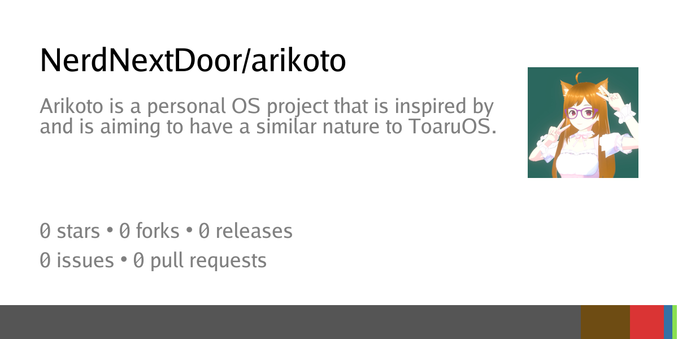#osdev
EDIT: The move has been completed! https://codeberg.org/NerdNextDoor/arikoto
I have an update about the #Arikoto #OS codebase.
I am planning to move Arikoto from #GitHub to #Codeberg at some point. (Possibly along with some other projects)
I hopefully plan to do this by the end of 2025, no promises.
Please boost this post so others know about the move.

#osdev question friends: Can I map virtual addresses to physical addresses of lesser alignment?
E.g. can I map a 2MiB aligned virt addr to a 4KiB aligned phys addr?
So far #osdev is seeming somewhat less fraught on RISC-V than x86, though admittedly I haven't really done anything yet.
On a forum I frequent for hobby operating system developers, somebody has posted code that doesn't work (nothing unusual there, most code posted on the forum doesn't work). However, this code was written with generative AI.
WHY?!?!
Writing a hobby operating system is by definition something you do for fun. Why on earth would you skip the actual bit where you do the hobby?!
Unikernel Guide: Build & Deploy Lightweight, Secure Apps https://lobste.rs/s/fpljpw #devops #osdev #security
https://tallysolutions.com/technology/introduction-to-unikernel-2/
git: purgatorio – the WIP 64-bit port of Inferno via @lproven https://lobste.rs/s/ogd44u #osdev #unix
https://git.9front.org/plan9front/purgatorio/HEAD/info.html
After hacker summer camp I’m going to get back to my RISC-V simulator (which already has a name).
What should I call the little OS I’m writing for RISC-V?
Fedi Osdevs, please I need I to know:
Why is the physical address in real mode segmentreg * 16 + offset?? Where does the 16 come from?
If you are using #DTrace on #FreeBSD, then I've got good news for you.
I've added a new manual to FreeBSD. It's called d(7) and it is a short reference of the #D scripting language. Currently, it covers only a subset of all variables and functions, but we'll add more iteratively.
Here are some previews for you:
HTML: https://people.freebsd.org/~0mp/d.7.html
MDOC (view with man(1)): https://people.freebsd.org/~0mp/d.7
Have fun tracing your systems!
Bedrock: A tiny, portable 8-bit virtual computer (uxn fork) via @arnelson https://lobste.rs/s/d4egpg #osdev #virtualization
https://benbridle.com/projects/bedrock.html
TouchFS - Context-Aware File Generation https://lobste.rs/s/4vkret #osdev #vibecoding
https://touchfs.io/
#Google #Fuchsia re:workstation when?
Seriously, I'm thinking of forking Fuchsia from the last working workstation_eng build. I'm working to make it build right now.
Commit I'm currently working from: https://fuchsia.googlesource.com/fuchsia/+/453a566bb809becaf30c91a0d515030e348d9d3f
Let's bring Fuchsia's dreams back. If I get anywhere, the fork will be named "fuchsia-reworkstation"/"Fuchsia re:workstation".
Wish me luck.
In March, Tock contributors gathered (virtually) to hammer out priorities for improving Tock. Better Rust userland, better IPC, better dynamic loading, and verification! It was so much it took nearly two months to write the summary
Memory safety is great, but it's not enough for critical systems. How do we guarantee type safety when interfacing with unsafe C code or hardware?
This ;login; article explores the challenges and solutions of doing so.
https://www.usenix.org/publications/loginonline/memory-safety-merely-table-stakes



